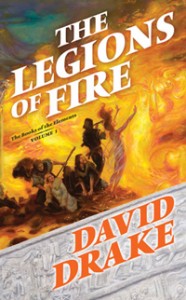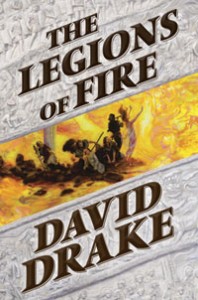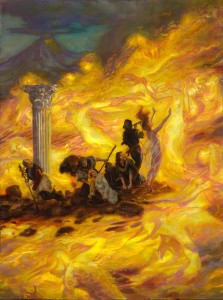The Legions of Fire is the first of a quartet of fantasies in The Books of the Elements series from Tor.
First and foremost, The Legions of Fire is a novel about a fictional city named Carce (pronounced CAR-see) and the empire which Carce rules. It is not a novel about Rome and the Roman Empire in 30 ad, under the emperor Tiberius.
Having said that, a reader who knows a little about Roman history and culture will find similarities with my Carce. A reader who knows a great deal about Rome will find even more similarities. I’m not writing a historical novel, however, or even a historical novel with fantasy elements.
The fantasy elements which I’ve used here, like the historical and cultural elements, are real. The Cumean Sibyl did exist; so did and do the Sibylline Books, which a committee of Senators examined when Rome was in particularly grave danger (for example, after the disaster at Cannae).
I prefer to use real things instead of inventing pastiches which I hope will sound right. The magical verses of this novel come from the Sibylline Books and (for reasons which will become clear to the reader) from the Voluspa, a Norse prophetic poem. (Occasionally you will find lines from other poems of The Elder Edda as well.)
There are various literary borrowings throughout The Legions of Fire. This wasn’t research on my part, exactly: I read classical literature for fun, and I found it easier to snatch something from (for example) the elder Seneca, or the Homeric Hymns, or Silius Italicus, than to invent it myself. (This is the first time in forty-odd years that I’ve found familiarity with Silius Italicus to be useful knowledge.)
One final note: the word “servant” occurs frequently in this novel. In Carce as in ancient Rome, the word generally means “slave.”
I’ve heard intelligent people state that classical slavery wasn’t as bad as slavery in America’s Antebellum South. You can make a case for that, but I consider it along the lines of arguing that the Spanish Inquisition wasn’t as bad as the Gestapo.
A Roman householder had the power of life and death–and sexual control–over the slaves in his or her “family,” and this power could be extended to freed slaves as well. I’m not writing a political tract, but the reader should be aware of this background in order to understand the social dynamics of The Legions of Fire. A servant in Victorian England might lose her position if the mistress became angry. A servant in Rome–or Carce–could lose considerably more.
I’ve had a lot of fun in trying to make a foreign culture accessible to modern readers. The fact that the culture is (pretty much) real and is one of the major underpinnings of Western Civilization made my task even more fun.

Paperback cover
But I’m not an educator. I’ll have succeeded if you readers also have fun with my story.
–Dave Drake
The Legions of Fire. The Books of the Elements. 2010, New York, NY: Tor. 368 p. 9780765320780 (hc) $25.99
Paperback May 2011 ISBN: 9780765360458

